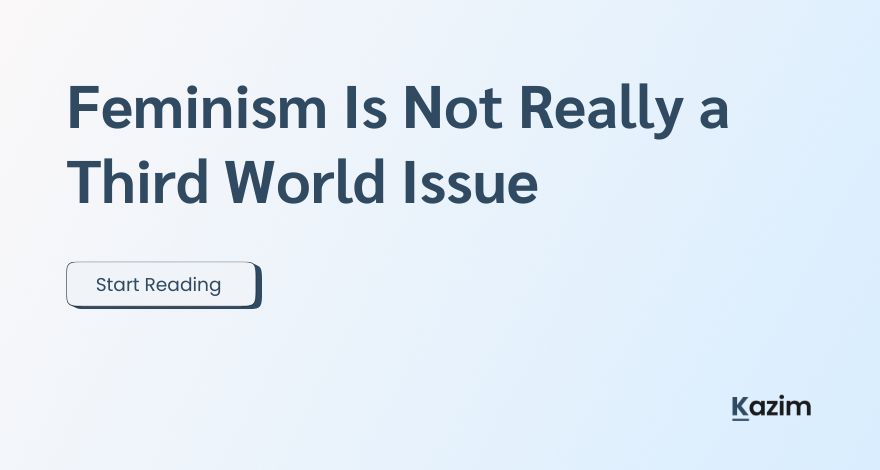The essay “Feminism Is Not Really a Third World Issue” was included in the CSS 2017 essay paper and is available on Cssprepforum after being thoroughly assessed by Sir Syed Kazim Ali, Pakistan’s leading CSS and PMS English essay expert. As this essay challenges the misconception that feminism is limited to developing nations and highlights that gender inequality is a global issue, it examines this perspective in various economic, political, and social domains. Thus, by publishing this insightful analysis, Sir Kazim aims to equip students with a comprehensive, research-based understanding of the main point of this title in a detailed and organized essay pattern.
Key Takeaways from the Essay
The essay “Feminism Is Not Really a Third World Issue” analyzes the widespread misconception that feminism is solely a third-world issue. In reality, gender inequality persists globally, as no country has successfully eliminated discrimination in political, economic, and social spheres. Thus, feminism remains a worldwide concern rather than a problem confined to developing nations.
To begin with, the essay cracks the term feminism, which emphasizes that it advocates for gender equality across all societies. It highlights that feminism is not limited to a specific region but addresses systemic discrimination affecting women everywhere. While challenges may differ between countries, the core issues of gender-based injustice remain universal.
Furthermore, the essay highlights how feminism is a global issue by examining political discrimination. Women remain underrepresented in political parties, struggle to participate in elections, and have minimal influence in decision-making processes. Notably, very few women hold leadership roles as heads of state, even in highly developed democracies. Thus, the persistent exclusion of women from positions of power shows that political marginalization is not confined to the third world but extends to advanced nations.
Additionally, economic disparities underscore the global nature of feminism. Wage inequality persists, with women earning less than men for the same work. And the “glass ceiling” prevents them from attaining top executive positions, limiting career advancement. Moreover, unequal access to financial resources, inheritance, and job opportunities restricts women’s economic independence. Even in developed nations, women continue to struggle for fair pay and equal employment rights.
Beyond economic concerns, social injustices also contribute to gender inequality worldwide. Women are often confined by societal expectations that assign them rigid gender roles. In addition, they face high rates of violence, including domestic abuse and workplace harassment, regardless of geographic location. Early marriages, particularly in conservative societies, hinder women’s education and career prospects. Similarly, discriminatory social norms reinforce gender biases, making it difficult for women to achieve equal status in any society.
The essay critiques the notion that feminism is unnecessary in developed nations, arguing that gender inequality exists in all societies, albeit in different forms. While third-world countries may experience more severe issues, such as child marriages and limited access to education, developed nations continue to grapple with wage gaps, workplace discrimination, and political exclusion. Thus, feminism remains relevant and necessary across the globe.
In conclusion, the essay asserts that feminism is a universal movement rather than a third-world issue. Indeed, political marginalization, economic disparities, and social injustices persist across all societies, making the fight for gender equality a shared responsibility. Ultimately, until the gender gap is fully closed in every sector, feminism would remain a vital force in the pursuit of justice and equal rights.
How Does the CPF Website Help You?
Crafting an essay is much like sculpting a masterpiece; it requires skill with the chisel, a clear vision, and a sturdy foundation. But many CSS and PMS aspirants in Pakistan find themselves crumbling under the weight of their expectations, often relying on shaky, outdated templates pulled from unreliable corners of the internet. In such a scenario, CSSPrepForum (CPF), a beacon of hope in this tumultuous sea of confusion, offers a revolutionary approach to essay writing that stands as tall as a lighthouse guiding ships to safety.
What distinguishes CPF from the crowded shoreline of exam preparation is its unwavering commitment to excellence. While other platforms bombard students with a hodgepodge of confusing essays akin to flotsam and jetsam, CPF delivers structured, research-driven content that flows like a well-planned river – smooth and purposeful. Each piece crafted by CPF is not just a collection of words; it results from a meticulous evaluation process by Sir Syed Kazim Ali, ensuring it meets the rigorous expectations of those who hold the keys to success: competitive examiners. And the essays here are the handiwork of Sir Kazim’s CSS, PMS top scorer students, making the CPF’s essay a mark of distinction for all aspiring candidates.
Stepping ahead, what CPF does besides essays is nurture the aspirants, teaching them to think like the champions they aspire to be. Too often, students stumble not due to a lack of knowledge but because their arguments lack coherence – a ship set adrift without a compass. So, CPF casts a guiding light, providing insightful writing strategies, in-depth content analysis, and exclusive tips in blogs by Sir Kazim, ensuring that students learn to weave their thoughts into high-scoring narratives.
So, with its unparalleled quality, expert mentorship, and transformative writing techniques, CPF arms aspirants to rise above the tide of competition and claim their rightful place among the stars.
Click the button below to start reading the complete essay.
